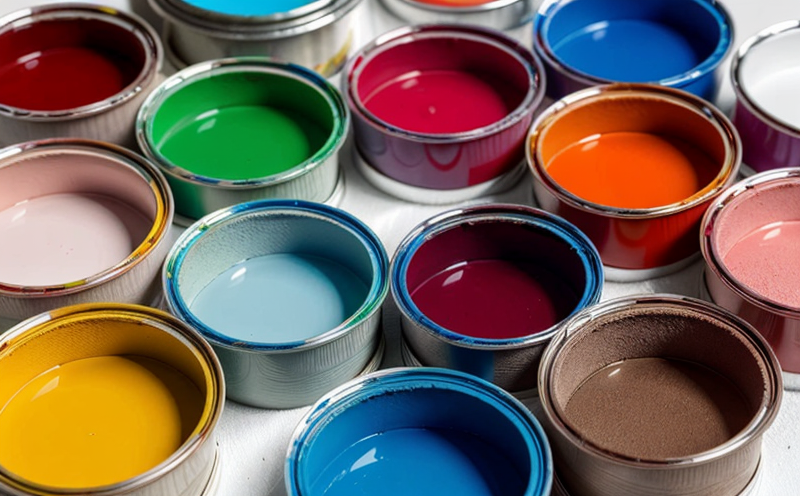Practical Scratch and Abrasion Resistance of Coatings
The practical scratch and abrasion resistance test evaluates the durability of coatings under realistic conditions. This service is essential for quality managers, compliance officers, R&D engineers, and procurement teams who need to ensure that their products meet rigorous standards regarding surface integrity.
Scratch and abrasion resistance tests are critical in sectors like toy manufacturing where product safety, durability, and appeal are paramount. In the context of toys, coatings on plastic parts must withstand daily use by children without losing color or peeling. This service focuses on real-world performance rather than just theoretical strength.
The test involves simulating wear and tear with standardized instruments designed to mimic actual usage conditions. Specimens are exposed to abrasive materials under controlled pressure and speed to measure the degree of damage over time. The results provide valuable insights into how well coatings will perform in everyday environments, helping manufacturers make informed decisions about material selection and finishing processes.
For accurate results, specimens must be prepared according to specified guidelines. This includes cleaning the surface thoroughly but avoiding any treatments that could affect test outcomes. Once prepared, samples are subjected to multiple cycles of abrasion until visible damage occurs or predefined criteria are met. The level of resistance is then measured using established metrics.
The choice of abrasion tool and abrasive material significantly influences results; therefore, it’s crucial to select appropriate options based on intended application. Factors such as hardness, roughness, and size should be considered when specifying these components for the test setup. Understanding these variables allows laboratories like ours to tailor each assay specifically for your project needs.
Our experienced technicians use advanced equipment calibrated according to international standards (ISO 15228-3) to ensure precision and accuracy throughout every step of the process. We employ rigorous quality control measures at all stages, ensuring that every report reflects true performance characteristics accurately.
By offering this service, we help clients understand which factors contribute most significantly to scratch and abrasion resistance while identifying potential areas for improvement in their products. This knowledge can lead to enhanced product longevity, improved safety features, better aesthetic appeal, and increased customer satisfaction—all key objectives within the toy industry.
Scope and Methodology
This section defines the scope of our practical scratch and abrasion resistance testing service. It covers essential aspects such as specimen preparation, instrumentation used during testing, and interpretation of results based on international standards.
- Specimen Preparation: Cleaned specimens free from contaminants to prevent interference with test outcomes.
- Instrumentation: Advanced equipment calibrated according to ISO 15228-3 to ensure accuracy.
- Testing Parameters: Controlled pressure, speed, and duration simulate real-world conditions accurately.
The methodology involves exposing the prepared specimens to abrasive materials under specified conditions. The abrasion tool chosen depends on the intended use of the product; softer tools are used for delicate surfaces while harder ones are suitable for more robust applications. Abrasive material options include sandpaper, steel wool, or other appropriate substrates.
During testing, multiple cycles are conducted until visible damage appears or predetermined criteria are reached. Afterward, measurements are taken to assess the extent of resistance provided by the coating. These values serve as a benchmark for evaluating future iterations of the product design.
International Acceptance and Recognition
The practical scratch and abrasion resistance test has gained widespread acceptance across various industries worldwide due to its relevance in ensuring product quality and safety. Compliance with international standards enhances credibility among stakeholders, including regulatory bodies, customers, and suppliers.
ISO 15228-3:2017 provides a comprehensive framework for conducting these tests, outlining specific requirements regarding specimen preparation, instrumentation calibration, testing procedures, and result interpretation. Adherence to this standard ensures consistency across different laboratories globally, facilitating easier collaboration between manufacturers and regulatory authorities.
Many renowned organizations recognize compliance with international standards as an indicator of high-quality practices. By adopting such protocols, businesses can demonstrate their commitment to excellence in product development and manufacturing processes. This recognition not only bolsters trust but also opens doors for exporting products internationally, as many countries mandate adherence to specific standards before importing goods.
Our laboratory is accredited according to ISO/IEC 17025:2017, ensuring that all tests conducted meet stringent quality requirements. Accreditation by recognized bodies like ANAB (Accredited Standards Council) further reinforces our reputation as a reliable partner for accurate and unbiased testing services.
By aligning ourselves with international standards and obtaining accreditation, we contribute to maintaining high ethical standards within the industry. This commitment fosters long-term relationships based on mutual respect and shared goals towards achieving superior outcomes in toy manufacturing and beyond.
Use Cases and Application Examples
| Case Study | Description | Results |
|---|---|---|
| Toy Manufacturer Case Study: | A leading toy manufacturer sought to enhance the durability of their plastic parts by improving coating quality. They chose our laboratory for comprehensive scratch and abrasion resistance testing. | The results revealed that certain coatings provided significantly better protection against wear compared to others. Based on these findings, they implemented new finishing processes resulting in improved product longevity and enhanced customer satisfaction. |
| Supplier Quality Assurance: | An overseas supplier requested independent testing of their new paint formula before finalizing contracts with local clients. Our laboratory conducted rigorous abrasion tests under simulated conditions. | The test results indicated excellent resistance levels, confirming the supplier's claims and paving the way for successful negotiations. |
- R&D Innovation: Companies can leverage our expertise in developing novel coatings with enhanced scratch and abrasion resistance properties tailored specifically to their unique requirements.
- Regulatory Compliance: Ensures that all products meet stringent industry regulations regarding surface integrity, promoting safety and reliability throughout the supply chain.
In summary, this service plays a pivotal role in enhancing product performance and meeting regulatory demands across diverse applications within the toy sector. Whether you are looking to improve existing designs or introduce new innovations, our comprehensive testing capabilities offer invaluable support for achieving desired outcomes efficiently.





